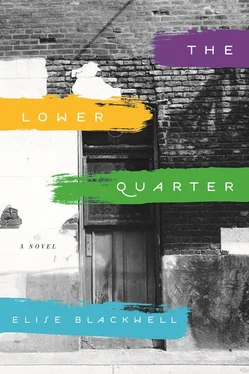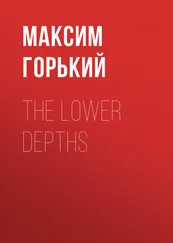“It was nice to see you like that,” Eli said when she turned. “Engrossed in your work like that. Like I told you, being able to concentrate on something else made prison bearable for me.”
Johanna tried to hide the depth of her breath. In Belgium she had not been allowed books or paper and pen. It had not been twelve years — she knew that she had been luckier than some, luckier than Eli in this way — but there had been no freedom at all, no future to plan. She had been suspended as a person, except inasmuch as she could feel pain and frustration and fear and boredom. Sometimes the accumulation of the three became something else: despair. There was nothing bearable about captivity; it was only that you could not actually die of it, even when you wanted to. And maybe she would have died of it, eventually, had not the possibility of freedom punctured her despair, arriving unexpectedly through the man who had, after the first, hurt her the most.
Marion
They’d enacted a prisoner scene, a variation of their play that Marion particularly liked. At first she’d hoped that her tattoo would rile Clay, would be the trigger for what followed. She suspected this had something to do with a desire to connect what happened in Clay’s house with her life outside it. Yet when the time came, she was more relieved than disappointed that Clay barely took note of her flaking shoulder. “Nice work,” he’d said, and he’d avoided the still-tender skin in their scene, landing his blows elsewhere on her body.
Usually Clay pushed her to leave almost as soon as they were finished — not actually throwing her out but letting her know through gestures of boredom and irritation, punctuated by small, insincere compliments. He’d ignore her — either not listening or pretending not to — when she told him some detail about herself, her past, her parents’ death.
Sometimes he would do more than ignore her; he would bring up on a laptop an online dating site so she could see him reading women’s profiles. “Hmm,” he would murmur, as though trying to follow her stories and failing through no fault of his own but simply because she was uninteresting and inconsequential. Then quickly, without sensible pause, he’d tell her that he admired the fact that her purse was small, as though that were some essential fact about her, as though it were more important than what she was trying to tell him. She would leave, sometimes angry and sometimes hurt, often but not always vowing to herself that she would not return, that the next day she’d stop by the tattoo parlor and ask Eddie if his other offer was still good. She and Eddie would go on dates, like a real boyfriend and girlfriend. They’d go hear live music and take walks on the levee, and she’d slip him free drinks at Molly’s, and he’d continue his work on her back in exchange. Maybe when her bruises faded so that she would not have to explain them, these things would prove additive, would become something more, though the simple relationship she imagined was just plenty. What she imagined was more than she had ever had.
But on this day — the first in a while that they’d seen each other, the first, in fact, since his father had arrived in town — Clay indicated that he wanted her to linger. She’d slipped back into her panties but was otherwise undressed, and they were talking like normal people, and she was running her finger along the top of the books on one of the many bookcases.
She stopped at the one whose title read Damsel in Distress and pulled it out, expecting it to be just the sort of book that she’d read too young, her first erotic exposure setting her sexual bent even before she’d noticed a boy as anything other than an inconvenient brother or a playground rival. But Damsel in Distress was a graphic novel, and he was the author: Clayton Fontenot. The drawing on the cover was of a woman with long blond hair, visible through the floor-length window of a tower. Though the woman’s features were merely suggested, there was something familiar about her, perhaps the angle of her limbs, her erect carriage, her long neck.
“Like me, an hour ago.” Marion tried out a smile but, as always, felt insecure around Clay in a way she never did in real life.
Clay looked at her for an unnervingly long time. “Except the opposite because we’re all pretend. The consent is in the frame of what we do. A real damsel in distress, that’s someone who has no choice, someone you have to sacrifice yourself to save.”
Yet again he’d managed to hurt her feelings despite the fact that she didn’t really care about him outside this place, not anymore, if she ever had. Again she thought of Eddie, or someone like him.
She didn’t hear the noise, not at first, but Clay’s ears picked up something downstairs. “Get in the closet,” he said, “and don’t make a sound or come out until I say so. Do you understand?” More emphatically, his voice hard and ugly: “Do you understand?”
Though he delivered the words as an order, almost as though he were starting a new scene, there was something foreign in his tone. It was fear. She did as he said, for a moment worried that burglars had entered the house, that the danger was real. But she figured it out even before she had confirmation: His father had come home earlier than expected, and Clay did not want him to see her.
She considered her options, trying to play each out to one of its possible endings, but her imagination failed because she didn’t know enough about Clay’s father to make an educated guess. Clay feared him, obviously, but whether his fear was necessary she didn’t know or, if it was, in what way it made sense. It could have been any of a hundred things.
The closet she stood in was fairly small and held Clay’s clothes. Not the T-shirt and old corduroys he usually wore when she saw him but slacks and button-up shirts and a few jackets. She made a space for herself amid the shirts, their smell a mix of starch and Clay’s cloistered odor. Clay tapped on one of the many keyboards in his room in a fast but irregular pace.
His father’s voice sounded from the direction of the room door, deep and loud, with the drawl of a rich man: “I am going to ask you a question, and it is imperative — imperative, mind you — that you answer honestly. No games, no omissions.”
“Can we please do this later?” she heard Clay ask. “I’m working.”
“Interesting choice of verb for a man with no job.” There was triumph in the tone, and Marion understood more about Clay than she had a minute earlier.
“I have a book contract and a deadline. It is a job.”
“Drawing pictures for your little stories? Fine, fine, but this can’t wait. You asked me if I knew our Central European friend was coming to town. What I need to know from you is whether you did, or — and this is the important part — whether you talked to him or saw him while he was here.”
“I’d rather talk to Jack the Ripper,” Clay said, just loud enough for Marion to discern. “He would at least provide an interesting topic for discussion.”
Marion shifted her weight to her left foot and felt the oxford cloth of a shirt against her left cheek.
“I seem to recall I said no games and no omissions. If you saw him, then fine, but tell me now. How did you know he was here?”
“Don’t you have somewhere to be? A fund-raiser, wasn’t it? I’ll drive you, and we can talk on the way.”
“Well, your little offer of help, while much appreciated, I assure you, is so completely out of character that it makes me quite certain there’s something you’re still not telling me. I’ve got the Fontenot name to protect, which I can do, no matter what, but only if you’ll give me accurate information. How did you know he was deceased?”
Читать дальше












